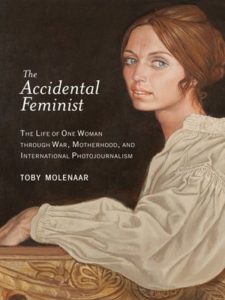

Reading ‘The Accidental Feminist’ and encountering Chico the Deia monkeyMarch 8, 2018
The poet paused in his reading, gazed out to sea. His audience, gathered in the shade of the olive grove, studied his face and waited for him to return from whatever far-off land of the imagination he had voyaged to. With his craggy face, broken nose and halo of white curls, he looked like a cross between an ancient Roman emperor and an ex-boxer.
Without warning, it began to rain. But only directly above the poet. The people in the olive grove were startled. They had seen many strange things in Deia but never rain falling only on one person. How remarkable yet appropriate that this was the poet, who had been known to claim that he was able to make it rain by magic.
The poet visibly came back into himself. He looked up into the tree, narrowed his eyes, sighed, and said “Toby, take your infernal beast away.”
A tall elegant woman, blushing crimson underneath her deep tan, stood up and called “Chico!”.
Chico, who had just pissed all over Robert Graves, scampered down the olive tree, ambled over to Toby and took her hand. They walked away together, Toby hissing curses at the monkey who chattered away at her.
Graves watched the odd couple walk off together. He patted the top of his head and began to laugh.
A monkey from the Amazonian jungle
Some time in, I guess, the early 1970s the photographer Toby Molenaar, who lived in Deia, was on an assignment in the Amazon jungle. A group of hunters in the camp she was staying in accidentally killed the mother of a baby woolly monkey. The baby monkey quickly attached itself to Toby. When she left, the hunters gave him to her as a gift.
In her book, The Accidental Feminist, Toby wrote, “I looked at them, my friends, my guides and protectors, a small group of tough men standing there proud and happily convinced that I loved and wanted the little thing! There was simply no way I could refuse…”
Back in Deia, the monkey Toby named Chico stayed with her family for several years. In the mornings, “his arms in the air like a prizefighter,” he accompanies Toby, her mother-in-law, a red tomcat and a black goat down through the terraced gardens picking fresh fruit for breakfast. During the daytime he runs free and at night he sleeps in a large wooden cage. In winter he has a blanket and a hot water bottle.
Apparently, Chico had a habit of raiding the kitchen of the local convent for sweet buns. A tourist once saw him being chased down the street by a nun with a cane.
Can you imagine? It must have been pretty freaky in Deia at that time anyway, what with all the eccentric poets, artists, musicians and full-time crazies. But seeing a monkey being chased by a nun in the middle of a village on a Mediterranean island would certainly have had you believing your drink had been spiked.
Mind you, it’s better than a bun chasing a nun chasing a monkey.
Whatever happened to Chico?
Toby had always known that Chico wasn’t meant to be a pet and should never have left the rain forest. In The Accidental Feminist, she explains that she “kept and cared for him as long I could, accepting fifty-dollar bills pried from my wallet and chewed to wet rags, bags of flour strewn all over the kitchen floor or angry neighbours’ complaints that he had once again stripped their precious banana tree.”
A banana tree in Deia? I wonder if it still exists.
When Toby hears that the Barcelona zoo is planning a monkey island and is looking for a young adult woolly monkey, she gives him to the zoo. With a heavy heart, I’m sure. Her daughter Cathy visits Chico at the zoo but he doesn’t appear to recognise her, which must have been rather sad.
The Accidental Feminist
Toby Molenaar’s wonderful memoir The Accidental Feminist was recommended to me by Nancy Banks.
Toby was born in Holland and moved to Switzerland after World War II. She lived in Deia with her then husband, journalist and author Fred Grunfeld and their children throughout the 1960s. Her photographs and writing have been featured in many international publications.
 The Accidental Tourist is a vivid memoir of an especially colourful life. But, if you’re fascinated by Deia, it’s Toby’s writing about her time in the village that is most worth reading. It’s also a great reminder of the fact that, no matter how much it might appear to change, Deia and its surroundings remain essentially the same. Here’s Toby’s description of when she sees the village for the first time:
The Accidental Tourist is a vivid memoir of an especially colourful life. But, if you’re fascinated by Deia, it’s Toby’s writing about her time in the village that is most worth reading. It’s also a great reminder of the fact that, no matter how much it might appear to change, Deia and its surroundings remain essentially the same. Here’s Toby’s description of when she sees the village for the first time:
“The narrow road skirted a coastline broken by rocky headlands and small carpets of beach, more guessed at than seen. When it turned inland we saw, on a hilltop perched between the mountain and the sea, a small medieval Bethlehem crowned by its church. Caught in the late afternoon sun, the houses glowed warm ochre, the mountain wall behind them flamed a deep red, below us the sea stood blue and still. We walked the steep streets, past stone houses shaded with vines, through olive groves dappled with orange trees, under arches of dark carobs and silver-gray fig trees with luminous new leaves shining like small candles. The path led ever down to the rocky cala, one of the more inaccessible and beautiful rock-strewn beaches on the coast. Its water was transparent, the green-blue of dreams, a gentle surf grated on the beach, smoothing pebbles into gems. It was early May, the little torrent was still cascading over its stony bed in its rush down to the sea, small birds were singing and somewhere far off a mule brayed. There was a smell of warm earth, a heady scent of things green and growing that filled the senses. This is how I remember our arrival and I have never wondered how it came about that we simply stayed on…“
I’m sure all of us who love Deia remember how thrilling it was when we saw the village for the first time. For myself, I had trouble believing it was real. I certainly felt the sea to be “the green-blue of dreams”.
If you’d like to get a sense of how wild Deia can be and read an excellent memoir into the bargain, I thoroughly recommend The Accidental Feminist.
And if anyone has a Chico the monkey story, please get in touch with me at holzer.david@gmail.com.







